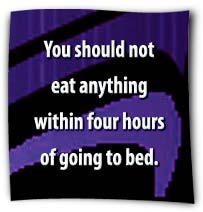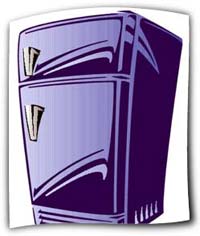
I was diagnosed as having a hiatus hernia and reflux esophagitis. My doctor suggests six small meals each day, two 20 mg. tablets of losec each day, and that I stay away from acid foods. Are there other dietary recommendations?
|
We have abbreviated your question, although we did notice that you say you enjoy your food. We wonder if that is a euphemistic way of saying you are overweight. Reflux esophagitis is when the stomach contents wash back up the esophagus because the sphincter and—in your case—the hiatus hernia are permitting backflow. Because gastric juices are usually acid, they damage the esophageal lining, making it raw and subject to cancerous change more than others.  Studies have confirmed that overweight people have more “acid reflux” than thin people. Additionally, eating just before bedtime is not a good thing. You should not eat food within four hours of going to bed. It may also help if you were to place a brick beneath each of the feet of the headboard on your bed, so as to encourage the esophageal contents to drain into the stomach. Avoid a tight belt, which increases intraabdominal pressure. Studies have confirmed that overweight people have more “acid reflux” than thin people. Additionally, eating just before bedtime is not a good thing. You should not eat food within four hours of going to bed. It may also help if you were to place a brick beneath each of the feet of the headboard on your bed, so as to encourage the esophageal contents to drain into the stomach. Avoid a tight belt, which increases intraabdominal pressure.Small meals tend to cause less reflux, but you may not require six of them. Spicy foods, with strong pepper or vinegar contents, are definitely not good. Bland food is more likely to neutralize the acid. Losec is a very interesting medication. Losec is a “proton pump inhibitor,” which means it slows the pumping of hydrogen ions (H+) into the gastric contents. Because acidity is caused by a high hydrogen ion concentration, losec can cut acid production so significantly that your esophagus will heal. Of course, surgery can be performed for the hiatus hernia. But if losec does the trick along with the other advice, you don’t need it. We hope you feel better soon.
|
My husband was recently diagnosed with intermittent clandication. The doctor prescribed medication, but my husband had to discontinue it because he could not tolerate the tachycardia that he experienced as a side effect. We are searching for alternative treatments.?
|
Intermittent claudication is severe pain that is experienced in the calf muscles when walking. This condition is a result of the vessels supplying the blood to the muscles becoming so narrowed that sufficient blood flow cannot get through to nourish the muscle. Consequently, a buildup of lactic acid takes place in the muscle when walking, due to insufficient oxygen to meet the metabolic demands of walking. For some people, the clandication causes them to cease activity that protects the heart. Thus, it is likely that even the coronary arteries are narrowed with atheroma (fatty deposits in the arteries). Of course, avoidance of all tobacco smoke is very helpful, and yet we have to consider the causes of atheroma. A diet rich in saturated fats—usually animal fats—promotes the formation of atheroma. It would be wise to avoid butter, meat, and partially hydrogenated fats (trans fats) completely. Oils such as olive, canola, sunflower, or flaxseed in small amounts are much better than saturated fats. A low-fat diet may help your husband. If your husband is overweight, he needs to lose weight. Exercise (such as swimming, rowing, or resistance training) could help. However, they need to be engaged in cautiously to avoid heart strain. Your husband should consult your doctor before beginning an exercise program. If either diabetes or hypertension is present, each should be meticulously controlled. Hot and cold hydrotherapy may help by dilating blood vessels in the legs. But it is likely that the vessels are calcified, so I wouldn’t expect too much from this treatment. Vitamin B6 may cause dilatation of blood vessels, but also causes flushing. It will not cause harm to exercise to the point of pain, and then to rest. In fact, a program wherein you push to the point of pain may stimulate more efficient muscle formation, and cause new blood vessels to grow to feed the muscle. Growing older is not easy, as we all can relate! Thank God, He will make all things new—even your husband’s aging vessels for.
|
I read James Nix’s article “Growing Up Adventist: No Apologies Needed” (Mar. 23, 2006). He said, among other things, “Nothing containing meat, black pepper, or mustard appeared at church-related potlucks.” Has our church changed its stance on black pepper and mustard? What were the original reservations?
|
To our knowledge, the church as an organized institution never had a “stance” on black pepper or mustard. Even today, it does not have such a stance. The church points out broad principles, although it does enjoin the abstinence from harmful substances such as alcohol and tobacco. Ellen White commented about black pepper and mustard as being among the group of condiments that perverted the natural taste for plain, wholesome foods. She deplored the fact that young children were demanding pickles, spicy foods, and hot “chow chow” to go with their meats and cheese. She spoke of the irritative action these kinds of foods have upon the stomach.  Today, one of the major reasons for the use of these condiments is much less common. Often foods in Ellen White’s day were spoiled for lack of refrigeration, and condiments were used to mask the fact that the food was not fresh. (We hate to be blunt, but perhaps the foods were badly spoiled!) Today, one of the major reasons for the use of these condiments is much less common. Often foods in Ellen White’s day were spoiled for lack of refrigeration, and condiments were used to mask the fact that the food was not fresh. (We hate to be blunt, but perhaps the foods were badly spoiled!)Clearly, wholesome fresh food is what Ellen White promoted. Without the need to mask spoiled foods, much of the reason behind condiments disappeared. There are still some who take strong, hot black pepper, and as many can attest, it can cause gastritis. We do not recommend it. Sweet peppers, with their antioxidant and phytochemical contents, may actually be very good for us. It is not always easy to contextualize Ellen White’s letters and writings. But she said that she and her husband did not have black pepper in their home for many years. Obviously, it is not an essential for a healthful lifestyle. _________________________________________ Allan R. Handysides, M.B., Ch.B., FRCPC, FRCSC, FACOG, is director of the General Conference Health Ministries Department; Peter N. Landless, M.B., B.Ch., M.Med., F.C.P.(SA), F.A.C.C., is ICPA executive director and associate director of Health Ministries. Send your questions to: Ask the Doctors, Adventist Review, 12501 Old Columbia Pike, Silver Spring, Maryland, 20904. Or you may send your questions via e-mail to mailto: [email protected] While this column is provided as a service to our readers, Drs. Landless and Handysides unfortunately cannot enter into personal and private communication with our readers. We recommend that you consult with your personal physician on all matters of your health.
|